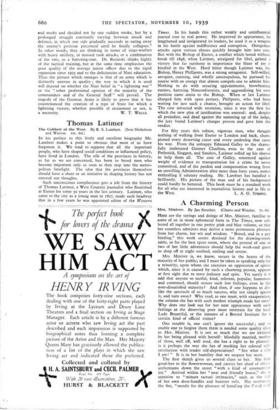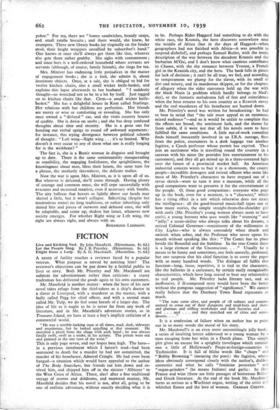A Charming Person
Mrs. Miniver. By Jan Scruffier. (Chatto and Windus. 7s. 6d.
HERE are the sayings and doings of Mrs. Miniver, familiar to some of us in more ephemeral form in The Times, now col- lected all together in one pretty pink and blue volume, so that her countless admirers may derive a more permanent pleasure from her charm, her wit and wisdom. " Boxed, and in a gay binding," this work seems destined for the drawing-room table, or for the best spare room, where the perusal of one or two of her little adventures should help the week-end guest to drop off at night soothed, smiling and serene.
Mrs. Miniver is, we know, secure in the hearts of the majority of her public; and I must be taken as speaking only fox a minority, upon whom she exercises an oppression of spirits which, since it is caused by such a charming person, appears at first sight due to mere jealousy and spite. Yet surely it is odd that anyone so tactful, kind, tolerant, popular, humorous and contented, should arouse such low feelings, even in the ever-dissatisfied minority? And then, if one happens to dis- like the spectacle of so much success, why not simply ignore it, and turn away? Why read, as one must, with exasperation, the column she has with such modest triumph made her own? Why does one look out for her next appearance with such feelings as the deserving poor must entertain for the local Lady Bountiful, or the inmates of a Borstal Institute for a certain kind of official visitor?
One trouble is, one can't ignore the successful ; and to enable one to forgive them there is needed some quality alien to Mrs. Miniver. It is not so much that we are irritated by her being pleased with herself : blissfully married, mother of three, well off, well read, she has a right to be pleased : is it perhaps the way she has of masking her colossal self- satisfaction with tender self-depreciation? " See what a silly I am! " It is in her humility that we suspect her most.
The first sketch gives us several clues to her. She bids good-bye to the flowerwoman, and carries her sheaf of chrys- anthemums down the street "with a kind of ceremonious joy." Arrived within her " neat and friendly house," she is sensitive to "minute tactual intimacies," such as the feel of her own door-handles and banister rails. She rearraruies the fire, "mostly for the pleasure of handling the f utzd st,:el
poker." For tea, there are " honey sandwiches, brandy snaps, and small ratafia biscuits ; and there would, she knew, be crumpets. Three new library books lay virginally on the fender stool, their bright wrappers unsullied by subscriber's hand." One knows at once she'll always get them like that, whoever else gets them rather grubby. She sighs with contentment ; and since hers is a well-ordered household where servants are servants (although; of course, family friends), she rings for tea.
Mrs. Miniver has endearing little prejudices in the matter of engagement books ; she is a fool, she admits it, about inanimate objects. Once, at a sale, she is obliged to bid for twelve kitchen chairs, also a small wicker knife-basket, and explains this lapse afterwards to her husband. " I suddenly thought—so wretched not to be in a lot by itself. Just tagged on to kitchen chairs like that. Clem—a small wicker knife- basket." She has a delightful house in Kent called Starlings. Her relations with her children are perfection. Her friends are merry or wise or comforting or revealing. She has only once owned a " disloyal " car, and she visits country houses of quality. She is down on snobs ; and she has deep confused thoughts about time and eternity. She is a great one for handing out verbal sprigs to round off awkward arguments : for instance, this trying divergence between political schools of thought : " Left wing—Right wing . . . it's so limited. Why doesn't it ever occur to any of them what one is really longing for is the wishbone? "
The fact is, she is a Barth woman in disguise and brought up to date. There is the same sentimentality masquerading as sensibility, the engaging foolishness, the sprightliness, the knowingness about men, bless their hearts, the same turn for a phrase, the motherly shrewdness, the delicate malice.
Now the war is upon Mrs. Miniver, as it is upon all of us. But whoever is defeated, she'll come through. Having plenty of courage and common sense, she will cope successfully with evacuees and increased taxation, even if necessary with bombs. The airy balloon that hovers so lightly above our heads may shrivel a little, but it won't collapse. Inheriting (despite her tendentious name) no long traditions, or rather inheriting only mixed bits and pieces of outworn and debased ones, she will be adaptable, and come up, shaken but intact, whatever new society emerges. For whether Right wing or Left wing, the right are always right, and always with us.
ROSAMOND LEHMANN.





































 Previous page
Previous page